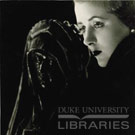The Future of the Library is Now
Imagine this—Students competing to design selected library spaces. Library departments combined to form units that reflect user needs rather than library tradition. Catalog search tools that send researchers to the information they want with just one click. Library kiosks that direct students to open study spaces. Details about collections delivered to users’ cell phones as they walk through the library. Digitized content streamed to researchers anywhere in the world. Users creating tags of comments and descriptive information that are linked to library records and materials. Librarians embedded in Duke programs abroad.
The World Wide Classroom
Laurent Dubois had never blogged or even built a web page before last summer. But when he found out that more than 50 students had signed up for his “World Cup, World Politics” class—he’d been expecting 30—he realized that a blog could provide an alternative discussion forum.
Librarians come out from behind the desk
Duke’s librarians are not waiting for people to find them at the reference desk, but instead are leaving the library to meet information seekers on their own ground.
Collections Highlight: John Wesley Blassingame and the African American Experience
The John Hope Franklin Research Center for African and African American History and Culture at the Special Collections Library recently acquired the papers of John Wesley Blassingame, a nationally renowned scholar of American history and the author of such influential works as The Slave Community: Plantation Life in the Antebellum South, Black New Orleans: 1860-1880, and Frederick Douglass: The Clarion Voice.
Notes
The Power of Refined Beauty: Photographing Society Women for Pond’s, 1920s–1950s
Human Rights Archive Acquires Papers of Carter Administration Official
Knowledge Bytes
Knowledge Bytes – Internet Sites Selected for the Readers of Duke University Libraries
Print version
A printable PDF version of this entire issue is also available. [2.5 MB download]








